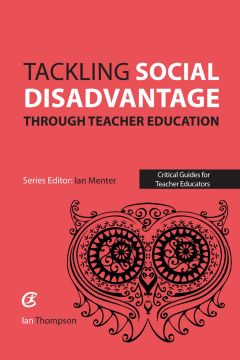
Additional Information
Book Details
Abstract
This book addresses key issues related to teaching pupils from disadvantaged and impoverished backgrounds and provides a valuable reference and pedagogical tool for teachers and teacher educators. Research has consistently shown that the most economically disadvantaged pupils have the poorest educational outcomes. Austerity government policies and pressures of performativity on schools may have exacerbated this inequality. Yet many teachers remain ill-informed about the effects of social disadvantage on students’ learning and consequently are ill-prepared in appropriate teaching methods. The text critically examines the lessons from previous policy and practice, discusses cognitive and affective aspects of school learning for disadvantaged children and explores the pedagogic implications of research evidence. Using insights from existing research, the book examines the reasons why some trainees and teachers lack a critical perspective on the contexts of poverty and may hold deficit views of students in poverty that suggests they are unable to learn and need to be controlled. It explains some of the links between poverty, special needs, literacy and educational achievement and focuses on strategies for improvement.
Ian Thompson is an Associate Professor of English Education at the University of Oxford where he teaches on the PGCE and Master’s in Learning and Teaching. He taught English for sixteen years in comprehensive secondary schools. He researches in the areas of English and literacy teaching, teacher education, collaborative learning, and social exclusion. These projects are linked through a commitment to researching social justice in education and the learning of those who face disadvantage.
Table of Contents
| Section Title | Page | Action | Price |
|---|---|---|---|
| Cover | Cover 1 | ||
| Half-title | i | ||
| Series information | ii | ||
| Title page | iii | ||
| Copyright information | iv | ||
| Table of Contents | v | ||
| Foreword | vi | ||
| About the series editor and author | vii | ||
| Chapter 1 The policy and practice of disadvantage in education in the UK | 1 | ||
| Introduction | 1 | ||
| Defining disadvantage and social justice in education | 2 | ||
| Social inequality in education | 3 | ||
| Teacher quality and teachers’ standards | 4 | ||
| The qualified teacher shortage crisis | 4 | ||
| Child poverty and schooling | 5 | ||
| The policy history of disadvantage and schooling in the UK | 7 | ||
| Social justice, social mobility and social inclusion | 9 | ||
| Policy differences in the four jurisdictions of the UK | 10 | ||
| Policy in England | 11 | ||
| Policy in Northern Ireland | 12 | ||
| Policy in Scotland | 12 | ||
| Policy in Wales | 13 | ||
| Key challenges for both initial teacher education and continuous professional development in schools | 13 | ||
| Chapter 2 Tackling social disadvantage in the classroom | 15 | ||
| Introduction | 15 | ||
| The cognitive effects of social and economic disadvantage | 16 | ||
| Psychological effects of poverty | 16 | ||
| Environmental aspects of poverty | 17 | ||
| The sociology of poverty | 18 | ||
| Poverty and special educational needs and disability (SEND) | 19 | ||
| Social learning in the classroom | 20 | ||
| Designing the classroom environment | 21 | ||
| Pupil grouping and resourcing | 23 | ||
| Assessing pupils’ progress in the classroom | 23 | ||
| The role of emotion and imagination | 24 | ||
| Tackling social disadvantage through research | 25 | ||
| Teacher collaboration to support vulnerable learners | 25 | ||
| Chapter 3 Challenging misconceptions of disadvantage | 28 | ||
| The pedagogy of poverty | 28 | ||
| Teachers making a difference | 28 | ||
| The consequences of testing and performativity | 29 | ||
| Poverty, educational attainment and well-being | 30 | ||
| Some realities for children living in poverty | 32 | ||
| Poverty proofing the school day | 33 | ||
| Deficit views of poverty | 33 | ||
| Social justice and ITE | 35 | ||
| Challenging deficit views of poverty through research | 35 | ||
| Oxford case study | 36 | ||
| Strathclyde case study | 37 | ||
| Conclusions | 38 | ||
| Chapter 4 Language, literacy and disadvantage | 40 | ||
| Introduction | 40 | ||
| Social disadvantage and language and literacy difficulties | 40 | ||
| Literacy, SEN and school exclusions | 41 | ||
| Literacy and permanent and fixed-term school exclusions | 41 | ||
| Literacy, exclusion and youth offending | 42 | ||
| Reading, writing and language impairment | 43 | ||
| The costs of exclusion versus early prevention or literacy intervention | 44 | ||
| English as an additional language | 46 | ||
| Language and literacy across the curriculum | 49 | ||
| Teachers as writers | 51 | ||
| Chapter 5 Researching poverty and teacher education | 53 | ||
| Introduction | 53 | ||
| The relationship between educational research and educational policy | 53 | ||
| Closing the gap? | 55 | ||
| Teachers as researchers | 56 | ||
| Research partnerships | 57 | ||
| Practitioner and action research | 58 | ||
| Researching disadvantage in education | 59 | ||
| Researching the pupil premium grant | 59 | ||
| Intervening outside the classroom | 61 | ||
| References | 64 | ||
| Index | 72 |
